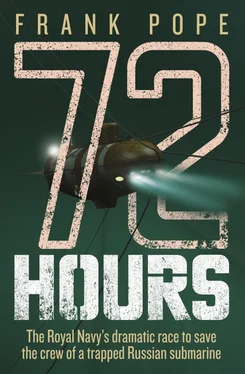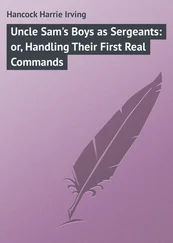‘It’s been on the news. I thought you were getting me a takeaway, not getting taken away!’
Gold laughed. ‘Honestly, Susan, I really don’t know what’s going to happen,’ he said. Mobilisations almost invariably ground to a halt before anything came of them. Once or twice he’d been through a couple that weren’t for an exercise. One Saturday morning about nine years ago, one of Her Majesty’s submarines had missed a scheduled report. He’d raced out of the house to get to the base, but had only got about halfway to Glasgow when Martin Bully had called him to say the submarine had called in and that everything was okay. The same sort of thing had happened when the Russian November-class submarine K-159 had sunk in August 2003. She’d been under tow on the surface with ten crew on board when she’d flooded and sunk. His team had scrambled to get ready, but before long it turned out, thanks to delays in reporting the incident within Russia, any action they could have taken would have been too late.
But Gold was now aware that there were things happening further up the chain. The fact that the BBC was reporting that his team were being despatched started to make him think that this might be serious.
Friday, 5 August
SS + 30 h 10 mins
10.40 UK – 13.40 Moscow – 22.40 Kamchatka
Moscow
In the back of one of the British Embassy’s black Volvo S70s, Captain Jon Holloway cursed. The White Ensign mounted on the front right wing hung limply from its pole. It wasn’t even two in the afternoon yet already Muscovites were piling out of the city for the weekend, clogging the roads with traffic. The journey to the Russian Ministry of Defence wouldn’t take more than five minutes on a normal day, but he’d already been in the car for twice that. The ministry closed at one, and though he’d called ahead to tell them to stay open, he didn’t want to keep them waiting. Impatiently he tapped his leg with the plain buff envelope containing the diplomatic note that was the object of his trip.
Holloway understood the workings of the Russian Ministry of Defence better than most, and knew that much depended on who he managed to get through to. Earlier in the day when he’d called to test the water and see if there was a chance that an offer of help from the UK would be accepted, he’d been stonewalled. He was not at all confident that his message had got through to the right people, and when he’d reported back to London he’d given the chances of being welcomed in by the Russians at only 20 per cent.
Improving relations with the Russians was his job. His Naval career as a submariner had taken a twist after he’d accepted a position on the Royal Yacht, when someone found out that he’d studied Russian. Some years later he was offered a shift into the diplomatic side of things. At first he found it strange. He’d been acutely aware that to his old shipmates being a Naval Attaché meant one long round of cocktail parties. He’d trained in the gritty, down-and-dirty elements of submarine engineering, and the delicate nature of diplomacy felt a world apart.
But now something real was happening. Submariners were trapped deep underwater, and diplomacy represented their best chance of seeing daylight again. Plus the value of a real-life rescue would do far more for future relations than the few Russian observers despatched to join international submarine rescue exercises. There were political risks, of course. They might be invited along but prevented from coming too close, as had happened with the Kursk. Or, worse, they might be allowed to help but set up to fail.
Much would come down to smooth communication. Even before they’d had ministerial clearance to make the offer, Captain Holloway had got his office to call and check availability on the evening’s Aeroflot flight out to Petropavlosk. Though economy class was full, he was told, there was plenty of space in business class. Weighing up the chances of things moving forward, Holloway decided to be prudent with Her Majesty’s Purse and wait to see how the UK’s offer was received before making the booking.
At last the embassy car took the right turn into the New Arbat road. At the imposing 1970s block that housed the Russian Ministry of Defence, the driver turned left and was waved through the security barrier, the diplomatic vehicle and plates enough to persuade the guard to let them pass without even stopping. They pulled up outside the worn-looking, Tsarist-era building that stood opposite the ministry, where the nation’s military foreign relations department was spread across three floors.
Holloway stepped up smartly to the front door and pushed inside, where he showed his diplomatic identity card to the sentry and said that the Duty Officer was expecting him. The sentry made a call, spoke a few words and hung up. A few minutes later the Duty Officer appeared and escorted Holloway up a flight of stairs to the first-floor meeting room. Weak sunlight filtered through old, tobacco-coloured windows. The photographs of Russian military might on the dark, wood-panelled wall looked similarly faded. Holloway’s gaze flicked across the boxy lines of the Russian tanks and missile-launchers that they pictured.
‘ Gospodin Duty Officer,’ said Captain Holloway. ‘We have heard reports that one of your submarines has become trapped underwater off Kamchatka. The government of the United Kingdom has a rescue system that your Navy is familiar with, and which can be on site within thirty-six hours. All we require is your government’s permission to help, and assistance with a vessel from which we can launch our rescue system. Our Scorpio robot is ready to leave at 11 p.m. tonight. It can be in Kamchatka eleven hours later, but what happens after that is up to you – we would rely on your equipment to get us from the airport out to the accident site.’
The officer – a major whom Holloway had not seen before – listened solemnly. He was evidently used to pushy foreign attachés, and knew that their stated intentions were often different from their real goals. But his duty was not to judge, just to listen and relay. He nodded curtly and said he would return shortly.
For 15 long minutes Captain Holloway sat in the gloomy meeting room before the officer finally returned.
‘ Gospodin , Attaché,’ the Major said. ‘Thank you very much for your offer. It is being given serious consideration personally by the Minister of Defence. We will contact you very shortly.’
With that he was shown back down the stairs and out of the foreign relations department. Whatever happened next would be a vital indication of how the Russians were treating the incident, and if anything had changed since the Kursk. When the UK had offered to help during that disaster it had been met with only a bewildering silence. It had taken four days for Putin finally to accept international offers of help, and even then they had hardly been welcomed. Holloway got back in the car and told the driver to head back to the UK Embassy. They’d hardly reached the end of New Arbat when his phone went. It was the head of the Operational Department of the Russian Naval Staff, Vice-Admiral Avdoshin – a man Holloway had got to know well.
‘Jon,’ Avdoshin said with no preamble. ‘Thank you for the British offer of help. I need to clarify one thing. What thickness of cable can Scorpio cut through?’
Holloway leafed through the specifications that he held in the folder he was carrying. ‘ Do semyi-desyati ,’ he said.
‘Damn,’ said Avdoshin. ‘We need to be able to cut through cables of eighteen millimetres, Jon.’
Holloway frowned. The Vice-Admiral sounded as though he was writing off the British offer of help after all. Then he realised. ‘Seventy’ in Russian sounded much like ‘seventeen’. Holloway clarified what he meant and the Vice-Admiral’s voice relaxed momentarily. Then he dropped his bombshell.
Читать дальше












